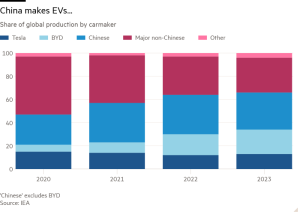AstraZeneca and MSD hail progress in tackling hard-to-treat cancers
Unlock the Editor’s Digest for free
Roula Khalaf, Editor of the FT, selects her favourite stories in this weekly newsletter.
Two of the world’s biggest drugmakers — AstraZeneca and MSD — have hailed progress in tackling hard-to-treat cancers, presenting data that showed improved treatment of advanced bladder cancer and a form of breast cancer.
The news came in separate studies published in the New England Journal of Medicine on Sunday and simultaneously presented at this week’s European Society for Medical Oncology (ESMO) meeting in Barcelona.
The results are the latest successes for Keytruda and Imfinzi, two drugs known as “checkpoint inhibitors”, which prevent cancer cells from disabling immune cells’ response to tumours.
Like many treatments introduced in recent years, the drugs harness the body’s immune system to fight tumours. Many offer hope for patients suffering cancers that have proved difficult to eradicate using conventional drug treatments via chemotherapy or radiotherapy.
Patients with muscle-invasive bladder cancer usually have surgery to remove the bladder after chemotherapy. But half of them experience the return of their cancer within three years.
For those receiving AstraZeneca’s Imfinzi both before and after bladder-removal surgery, and chemotherapy before surgery, the risk of disease returning reduced by a third over five years, according to one of the studies. Their risk of death fell by a quarter.
Susan Galbraith, the company’s head of oncology research and development, said the findings were “very compelling”, adding that the company would enter discussions with regulators to expand the use of Imfinzi.
The treatment was AstraZeneca’s third-highest selling drug in 2023, with $4.2bn in sales. It is currently approved to treat cancers including lung, endometrial and biliary tract cancer.
Meanwhile, 87 per cent of patients with early triple-negative breast cancer who were treated with MSD’s Keytruda drug and chemotherapy were still alive after five years, according to the results of another study. The rate compared with 82 per cent with the standard treatment.
The drug is approved for the disease in the US and Europe but the latest, long-term findings underline its benefits.
Triple-negative breast cancer represents 10 to 15 per cent of breast cancer cases and does not respond to targeted hormone therapies or those that target the HER2 protein. It is considered harder to treat and more aggressive than other forms of the disease.
Marjorie Green, the company’s head of late-stage oncology, said triple-negative breast cancer had historically had the worst outcomes for people with breast cancer. These findings could be “transformative” for patients, she said.
In another result, presented only at ESMO, MSD — known as Merck in the US — marked 10 years since the first approval of Keytruda by presenting results of a study on the treatment’s use in patients with advanced forms of the skin cancer melanoma.
The company presented results showing that a third of patients with advanced melanoma treated with Keytruda remained alive after 10 years. The figure compared with 24 per cent for patients treated with Bristol Myers Squibb’s Yervoy.
Since its launch, Keytruda has received 40 approvals for use in different conditions from the US’s Food and Drug Administration. It generated $25bn sales in 2023, more than any other single drug in the world.
Both companies are betting on developing new oncology medicines for further growth. The issue is particularly urgent for MSD because Keytruda will lose patent protection in 2028.
As a sign of future opportunities, Green pointed to the company’s collaboration with Moderna to develop a cancer vaccine. It has also reached a deal with Japanese biotech Daiichi Sankyo to develop targeted chemotherapies known as antibody drug conjugates (ADCs).
The Japanese company has already co-developed two ADCs with AstraZeneca. Enhertu has shown promise in treating breast cancer. But the companies’ efforts to secure approvals for a treatment for non-small cell lung cancer — datopotamab deruxtecan — have had a setback.
Shares fell nearly 5 per cent when trial results last week showed that it failed to show a statistically significant improvement in overall survival for patients in a late-stage trial.
The head of AstraZeneca’s oncology business unit, David Fredrickson, pointed out that the results showed progress in one subset of lung cancer patients. He said that meant the drug could still reach a peak target of $5bn sales a year by 2030, helping the company to its target of $80bn annual revenue by the end of this decade.
This article has been corrected to show that chemotherapy is given before surgery to remove the bladder, not after as originally stated.
#AstraZeneca #MSD #hail #progress #tackling #hardtotreat #cancers







